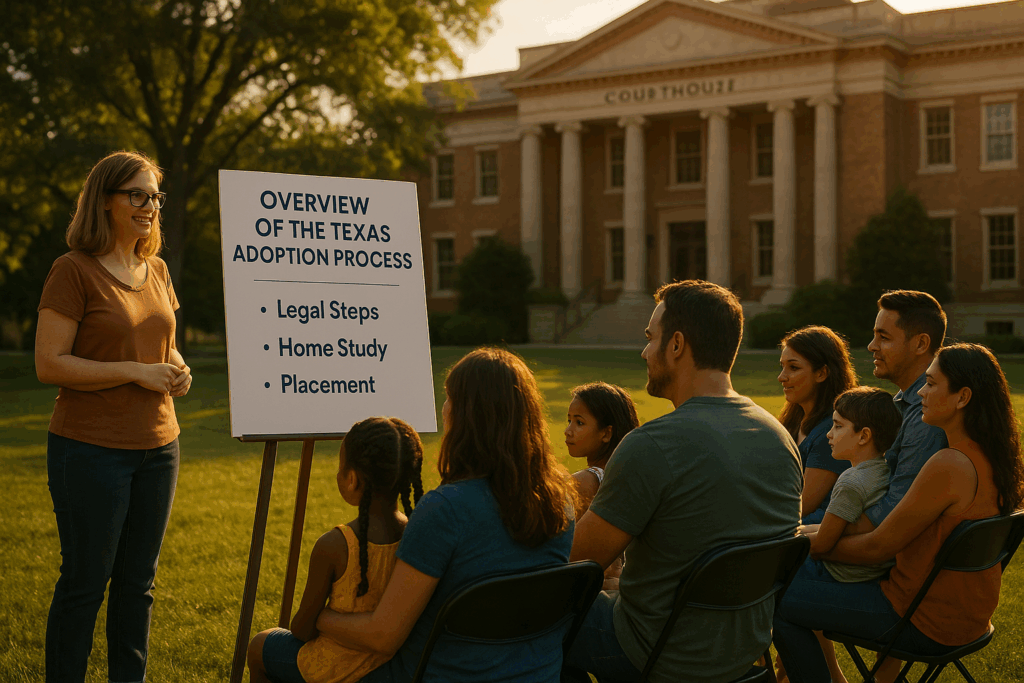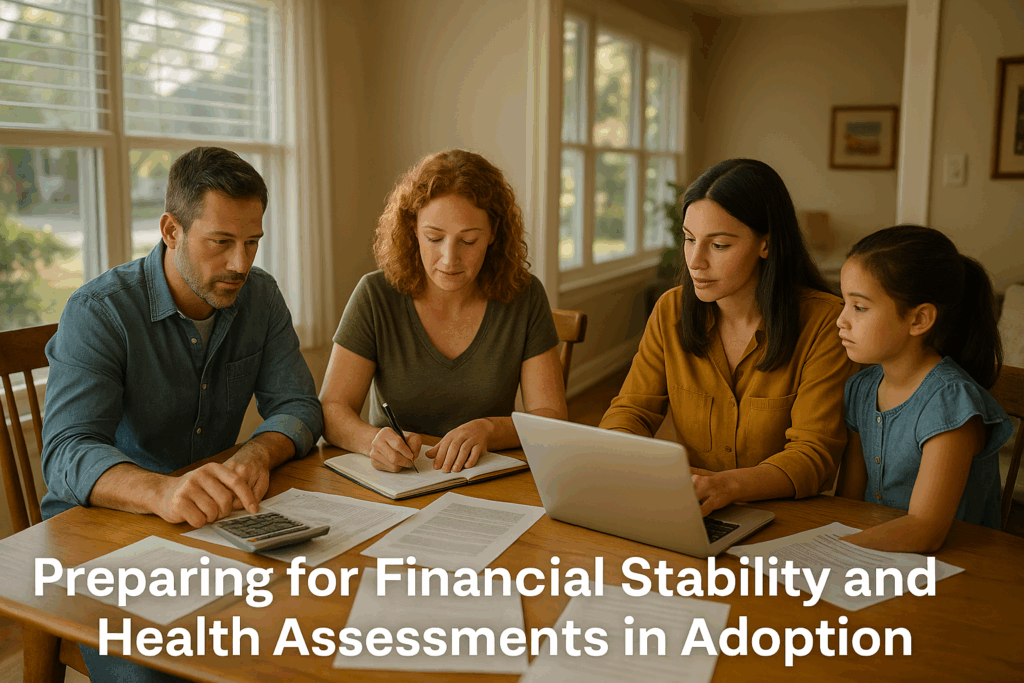
Ever thought adopting a child would mean dusting off your tax returns, updating your vaccination records, and maybe even explaining your grocery budget to a social worker? Welcome to the wonderfully complex—and incredibly rewarding—world of adoption in Texas.
If you’re just beginning your adoption journey, you’ve probably already bumped into terms like Texas Adoption Financial Stability and Health Assessments. And no, it’s not as scary as it sounds. In fact, these evaluations are designed to help ensure you’re fully prepared—legally, financially, and emotionally—to give a child the safe, supportive home they deserve.
So, what are these assessments really about? In short: proving you can provide a stable, healthy environment. But behind that simple answer lies a maze of paperwork, home studies, agency expectations, and deeply personal questions about your life. That’s where we come in.
Here at The Law Office of Bryan Fagan, PLLC, we believe that knowledge is power—and that you shouldn’t have to navigate this process alone. This blog post will walk you through everything from what financial documents you’ll need, to how your physical and mental health are assessed, to what might raise red flags (and how to fix them). We’ll even sprinkle in some real-world examples and practical tips to keep things grounded and clear.
So grab a cup of coffee, maybe a highlighter, and let’s make sure you’re ready to turn a child’s forever home from a dream into reality. Because educating families and protecting futures isn’t just our mission—it’s what we do every single day.
Key Takeaways
- The Texas adoption process involves legal steps, financial stability assessments, and health evaluations to ensure the well-being of the child and the suitability of adoptive parents.
- Financial stability is crucial, requiring prospective adoptive parents to demonstrate reliable income, manage child-related expenses, and maintain secure housing to support a nurturing environment.
- Health assessments are mandatory and include medical evaluations, mental health history, and vaccination records to ensure that adoptive families can provide a safe and healthy home for the child.

Your Adoption Journey Starts Here
Don’t navigate the adoption process alone. Schedule a consultation today and receive the expert guidance and support you need to build the family of your dreams.
Overview of the Texas Adoption Process
The Texas Adoption Financial Stability and Health Assessments are essential components of the state’s adoption process, designed to ensure that every child is placed in a safe, stable, and supportive home. Whether you’re pursuing private domestic adoption, foster care adoption, or international adoption, Texas law—particularly Texas Family Code §§ 162.001–162.026—requires a structured legal journey that prioritizes the child’s best interests at every step.
A critical first phase involves terminating the biological parents’ rights, either voluntarily or through court proceedings. After this, the adoptive family must file a formal petition to adopt. Throughout this process, having an experienced adoption attorney can help families navigate consent requirements, legal filings, and court hearings with clarity and confidence. These legal steps ensure the adoption is final, enforceable, and in full compliance with Texas law.
Next comes the home study, a comprehensive review that examines a family’s financial stability, physical and emotional health, living conditions, and overall readiness to adopt. The home study process is guided by both agency standards and statutory requirements, and it includes interviews, background checks, and household evaluations. This is where the Texas Adoption Financial Stability and Health Assessments take center stage—evaluators will review your income sources, budgeting habits, housing stability, and medical records to ensure you can provide a secure and nurturing environment.
These assessments aren’t about being perfect. They’re about demonstrating preparedness—showing that you have the emotional resilience and financial planning necessary to meet a child’s ongoing needs. If you’re wondering what documents you’ll need or what might raise red flags, you can find practical insights in The Complete Guide on How to Adopt a Child in Texas or visit our bryanfagan.com blog on adoption for related resources.
Adoption is as emotional as it is legal, and it’s normal to feel a mix of joy and nervousness along the way. At The Law Office of Bryan Fagan, PLLC, we’re committed to educating families and protecting futures by providing the legal support and compassionate guidance you need to move forward with confidence. Whether you’re gathering documents or preparing for a home study, we’re here to help you every step of the way.

Importance of Financial Stability in Texas Adoptions
In Texas, financial stability is a foundational requirement for adoptive families, as outlined in Texas Family Code § 162.023. The goal is to ensure that adoptive parents can provide consistent, long-term support for a child’s physical and emotional well-being. Rather than requiring a specific income level, courts and agencies focus on reliable income, sound budgeting, and the ability to maintain a stable home environment. These evaluations are part of the broader Texas Adoption Financial Stability and Health Assessments, which help determine whether a prospective parent is prepared to meet a child’s needs over time.
Prospective adoptive parents should expect to provide documentation such as recent tax returns, pay stubs, and a comprehensive monthly budget. This budget should clearly demonstrate the ability to cover current household expenses while accounting for additional child-related costs, including healthcare, education, and daily living needs. Demonstrating this kind of financial readiness assures the court that the child will be raised in a nurturing, supportive setting.
Many families are pleasantly surprised to learn that employer adoption subsidies and federal tax credits can significantly reduce the financial burden of adoption. These benefits often help cover legal fees, agency costs, and travel expenses. For more information about what adoption might cost and how to plan for it, visit Understanding the Average Cost of Adoption in Texas. Our firm’s adoption blog also offers practical financial tips tailored to Texas families.
As our attorneys often remind clients, financial stability isn’t about wealth—it’s about planning, consistency, and responsibility. If you’re considering adoption, preparing for this financial assessment early can prevent unnecessary delays and set you up for success. At The Law Office of Bryan Fagan, PLLC, we’re committed to helping families navigate each step with confidence and clarity, ensuring every child has the stable home they deserve.

Key Elements of Financial Stability Requirements
The key elements of financial stability requirements for adoption in Texas include income verification, monthly expenses and budget overview, and employment history and housing situation. These elements are critical in demonstrating that prospective adoptive parents have the financial capability and stability to support a child’s needs.
Thorough documentation and preparation are essential for meeting these legal requirements.
Income Verification
Income verification is a fundamental step in the adoption process, ensuring that prospective parents can meet the financial requirements necessary for adopting a child. Agencies often require tax returns from the past two to three years to verify income.
Accurate financial information allows adoption agencies to assess the financial stability of prospective parents, ensuring long-term financial assistance for the child.
Monthly Expenses and Budget Overview
Creating a comprehensive budget that outlines how prospective adoptive parents will manage child-related expenses is crucial. This budget should include all monthly expenses, providing a clear picture of financial responsibilities.
Detailed financial records are crucial to show the capability to meet a child’s needs and maintain a stable home environment.
Employment History and Housing Situation
Adoption agencies look for a stable employment history and secure housing when evaluating prospective adoptive parents. A stable employment history indicates financial reliability, which is essential for supporting a child’s needs. Additionally, prospective adoptive families must demonstrate that their home environment supports the child’s well-being and safety.
Stable employment and secure housing are vital for providing a nurturing environment and a stable and loving home for the child’s future.
Understanding Health Assessments in Texas Adoptions
In Texas, health evaluations are a required part of the adoption process, serving as a safeguard to ensure that adoptive families can meet a child’s physical and emotional needs. Under Texas Family Code § 162.023, prospective adoptive parents must undergo comprehensive medical screenings, including physical exams, mental health evaluations, and the submission of recent health statements and vaccination records. These requirements are part of the broader Texas Adoption Financial Stability and Health Assessments, which aim to confirm that the adoptive home is safe, stable, and capable of supporting a child’s long-term well-being.
Health assessments don’t demand perfection, but they do require transparency and preparedness. Agencies want to see that any existing medical or mental health conditions are managed in a way that won’t interfere with a parent’s ability to care for a child. Evaluations also include other household members, ensuring that the entire home environment supports a healthy, nurturing space. For a practical overview of what’s expected during this stage, families can refer to Essential Texas Adoption Answers: Home Study Checklist, which breaks down common requirements and how to prepare effectively.
As our family law team often advises, preparation is key to navigating the home study process with confidence. At The Law Office of Bryan Fagan, PLLC, we help families anticipate what health documentation may be requested and how to present a complete, accurate profile during their adoption journey. For additional guidance, explore our adoption resource hub to ensure you’re ready for every step.

Essential Components of Health Assessments
The essential components of health assessments for prospective adoptive parents include:
- Recent medical evaluations
- Mental health history or counseling records
- Immunization records
- TB testing
These components are critical in ensuring that the adoptive family can provide a safe and healthy environment for the child.
Recent Medical Evaluations
Recent medical evaluations are crucial for ensuring that an adoptive parent is healthy and capable of providing medical support in a supportive environment. Sometimes, prospective adoptive parents undergo drug screenings, depending on the requirements of the adoption agency.
Documenting recent medical evaluations showcases the health status of the adoptive parents.
Mental Health History or Counseling Records
Texas adoption agencies typically review an applicant’s mental health history to determine their suitability for adoption. This review helps assess the emotional readiness of prospective adoptive parents. Documentation of any past mental health treatment or counseling services may be necessary to demonstrate the emotional stability of the prospective parents.
Immunization Records and TB Testing
Up-to-date immunization records for all household members are a prerequisite for adoption processes in Texas, as outlined in the Texas family code. Adoptive parents must provide these records and may need to undergo tuberculosis testing based on local health requirements.
To ensure health and safety, Texas law requires tuberculosis screening for children being adopted.
Preparing for Financial Stability and Health Assessments
Preparing for Texas Adoption Financial Stability and Health Assessments is one of the most important steps in the adoption process, and it begins well before the home study takes place. Under Texas Family Code § 162.023, adoptive parents are expected to demonstrate both financial reliability and physical and emotional readiness. This means gathering essential documents early—such as income verification, medical records, and proof of insurance—and being ready to discuss your lifestyle, budgeting practices, and support systems with your adoption professional or caseworker.
Transparency is key during these assessments. Social workers want to understand not only your current stability but also how you plan to manage the lifelong commitment of raising a child. Open communication about your background, any health concerns, and your motivations for adoption helps build trust and streamlines the evaluation process. Adoption professionals aren’t just checking boxes—they’re looking to understand your family’s strengths and help prepare you for what’s ahead. For a closer look at how unique circumstances like military service may impact your adoption journey, see Military Adoption: Navigating the Path to Building a Family in Texas.
At The Law Office of Bryan Fagan, PLLC, we regularly guide families through the practical and emotional aspects of adoption, helping them feel confident and supported throughout the process. From reviewing required documentation to preparing for your home study interview, our team is committed to helping you meet—and exceed—Texas adoption standards. You can explore more in-depth preparation tips in our Texas adoption planning blog, which is full of tools and insights tailored to your journey.

Gathering Documentation Early
Collecting necessary documentation early in the adoption process ensures efficiency and readiness. This documentation should include income verification, health assessments, and other required documents.
Completing paperwork and reviewing documents early can help smooth the home study process.
Transparency and Honesty with Social Workers
Being transparent during assessments aids in fostering an open atmosphere that enhances the overall adoption process. Discussing personal backgrounds and adoption motivations helps social workers understand the adoptive family’s perspective. Maintaining clear communication with social workers builds trust and facilitates a smoother adoption assessment process.
Understanding Texas Standards of Stability
In Texas, stability for prospective adoptive parents is characterized by consistent income sources, responsible budgeting, and a reliable support network. A stable environment ensures the child will be cared for in a safe, nurturing, and predictable setting.
Meeting Texas stability standards involves emotional resilience, financial security, and thorough documentation.
The Role of Adoption Agencies and Attorneys
Licensed adoption agencies in Texas are required to provide prospective adoptive parents with comprehensive information about their services. Key Licensed adoption agencies and attorneys play a central role in guiding prospective parents through the Texas adoption process, particularly when it comes to meeting the requirements outlined in Texas Family Code § 162.023. Agencies are required to provide detailed information about their services and responsibilities, ensuring adoptive parents understand both the procedural and emotional demands of adoption. A key part of this journey includes satisfying the standards set forth by Texas Adoption Financial Stability and Health Assessments, which evaluate a family’s ability to provide a safe, nurturing, and stable home.
Throughout this process, adoption attorneys serve as legal navigators, helping families manage critical components such as termination of parental rights, filing the adoption petition, and preparing for the home study. They also assist with background checks, review financial and medical documentation, and ensure that all aspects of the adoption comply with Texas law. Orientation meetings led by adoption professionals help set expectations early, empowering parents to engage in the home study with openness and confidence.
At The Law Office of Bryan Fagan, PLLC, we understand how overwhelming adoption can feel—especially when legal terminology and agency requirements start to pile up. That’s why so many of our clients appreciate our straightforward guidance and compassionate approach. For those pursuing foster-to-adopt placements, we encourage you to explore Foster Child Adoptions to understand how these assessments apply in CPS-involved cases.
To dive deeper into what to expect during the adoption process, including how to prepare for the financial and health evaluations, visit our bryanfagan.com adoption resource blog. Our goal is to make the adoption process not only understandable but also empowering—because every child deserves a stable home, and every family deserves strong legal support.

Real-Life Examples and Client Testimonials
Clients often express that the assistance received during the adoption process provided clarity during an emotional journey. One family shared how the Law Office of Bryan Fagan, PLLC, helped them in navigating adoption, financial stability, legal fees, adoption assistance, family law, and the adoption assistance agreement, ensuring they met all requirements smoothly.
Another client highlighted the emotional support they received from the team, which made a significant difference in their adoption journey. These real-life examples demonstrate the firm’s dedication to guiding adoptive parents through every step, ensuring a successful adoption process and the importance of support groups.
How the Law Office of Bryan Fagan, PLLC Can Assist
The Law Office of Bryan Fagan, PLLC, offers legal guidance essential for navigating complex issues and ensuring all requirements are met in Texas adoption laws. They provide free consultations to prospective adoptive parents to discuss their cases and understand their legal options.
Their team supports clients throughout the adoption process, keeping them informed of timelines and requirements. The office assists with all legal documentation required for adoption, helping to streamline the process for families.
Key Takeaways: Financial & Health Requirements for Adopting in Texas
IAdoption is one of the most meaningful journeys a family can take—but like any journey worth taking, it comes with a few road signs, a map, and maybe the occasional unexpected detour. Understanding Texas Adoption Financial Stability and Health Assessments isn’t just about checking boxes—it’s about showing that you’re ready to welcome a child into a safe, steady, and loving home.
If you’re feeling a little overwhelmed, that’s okay. These assessments can seem intimidating on paper, but with the right guidance and a bit of preparation, you’ll be surprised how manageable—and empowering—they really are. And remember, you’re not expected to figure it all out alone.
At The Law Office of Bryan Fagan, PLLC, we’re here to walk beside you through every legal form, background check, and home study visit—offering support that’s both compassionate and strategic. Whether you’re just starting to explore adoption or you’ve hit a few bumps along the way, our team is ready to help you move forward with confidence.
So what’s your next step? Maybe it’s getting your documents in order. Maybe it’s scheduling a consultation. Or maybe it’s just sitting with the thought that you’re about to change a child’s life—and your own—for the better. That’s a pretty incredible place to be.
Let’s take the next step together. Reach out when you’re ready—we’d be honored to help you grow your family.
Texas Adoption Financial Stability and Health Assessments FAQ
What will disqualify you from adopting a child in Texas?
You may be disqualified from adopting in Texas if you have a recent history of child abuse, neglect, domestic violence, or certain criminal convictions such as felony drug charges or violent offenses. Unresolved mental health issues or unstable living conditions may also impact your eligibility.
How financially stable do you have to be to adopt?
You don’t need to be wealthy, but you must demonstrate consistent, reliable income and the ability to meet your family’s basic needs. Courts want to see responsible budgeting, stable employment, and a home environment that supports a child’s well-being.
Do you get a monthly check when you adopt a child in Texas?
In some cases, yes. If you adopt a child through the Texas foster care system or adopt a child with special needs, you may be eligible for monthly adoption assistance payments and Medicaid benefits under a Title IV-E adoption assistance agreement.
Can a biological parent regain custody after adoption in Texas?
No. Once an adoption is finalized in Texas, the biological parents’ rights are permanently terminated, and they cannot legally regain custody of the child.
What medical conditions disqualify you from adopting?
There is no list of automatically disqualifying conditions, but serious unmanaged physical or mental health issues that impair your ability to care for a child may raise red flags. You must demonstrate that your condition is stable and does not prevent you from meeting a child’s needs.
What are the income requirements to adopt a child in Texas?
Texas does not set a specific dollar amount, but you must show that your income is sufficient to provide a stable home, cover everyday expenses, and care for an additional child. Agencies typically review tax returns, pay stubs, and a household budget.
Do they check your credit score when adopting?
Credit checks are not always required, but some adoption agencies or evaluators may review your financial history to assess your ability to manage money. A poor credit score alone won’t disqualify you, but large debts or signs of financial instability could be a concern.
How much money do you need to be financially stable?
Being financially stable isn’t about a fixed amount—it’s about showing that your income reliably meets your household expenses, including child-related costs. A balanced budget, emergency savings, and a stable job are strong indicators of financial readiness.
Are there income requirements for adoption?
Yes, but they are flexible. Agencies and courts want to confirm that your income is sufficient to provide for the child’s needs without financial hardship. They consider your total household income, expenses, and financial planning—not just your salary alone.
Bryan Fagan is a Texas family law attorney with a heart for adoption—inspired not just by his legal career, but by his own family story. Growing up in Atascocita with two adopted brothers, Bryan learned early the profound meaning of chosen family. His passion for justice was sparked by John Grisham’s The Pelican Brief, and he became the first lawyer in his family, balancing night classes at South Texas College of Law while caring for his grandmother with Alzheimer’s.
Today, Bryan brings that same dedication to his practice, guiding families through adoptions, custody disputes, divorces, and complex marital agreements. A certified member of the College of the State Bar of Texas, he combines elite legal expertise with genuine empathy—drawing from his roles as a husband, father of three, and advocate for families facing false CPS allegations.
Based in Houston, Bryan is actively involved in the Houston Bar Association’s Family Law Sector and statewide family law organizations. Whether finalizing an adoption or protecting parental rights, he believes the law should reflect the deepest values of home, commitment, and love.

